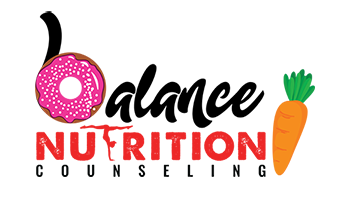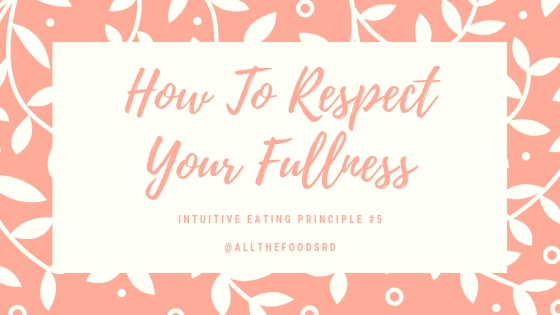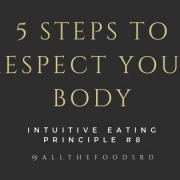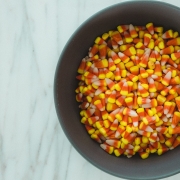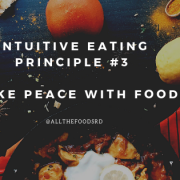So we are back to the Intuitive Eating series on the blog today! Today we are going to talk about Intuitive Eating principle 5, respect your fullness.
Every human is born with the innate ability to feel fullness and respect it by stopping eating. If you’ve ever watched a child eat, some days they eat a lot and some days they eat a little. That is because the human body needs a different amount of food everyday and kids are in tune with that. That is until adults (even when well meaning) or diet culture start to send messages that interrupt or skew that natural born ability. Who grew up in the clean your plate club!? The clean your plate club is one way that fullness cues become skewed. When we are full and then forced to clean our plate we are not listening to our body or respecting our fullness cues. This tends to translate into adulthood and something I work with clients on a lot. Another scenario that instills the clean your plate club mentality is chronic dieting. Dieting causes a license to eat at mealtime mentality when it is “allowed” or “legal” to eat.
Even if you don’t clean your plate there is still a chance you may not be listening to your body’s fullness cues. Some people are not able to recognize comfortable satiety and tend to eat to a level of uncomfortable before stopping. Satiety is a sense of satisfaction rather than an uncomfortable fullness.
So many of us our disconnected from our bodies. I find that a lot of people are not able to describe what comfortable satiety feels like. Some descriptions of comfortable satiety offered from the book, Intuitive Eating, are: a subtle feeling of stomach fullness; feeling satisfied and content; nothingness – neither hungry nor full. This feeling is highly individual and is something that needs to be personally experienced and practiced to understand what it feels like in your body. If you feel like you are not in touch with your fullness cues keep reading below to learn some steps on how to practice this.
How to respect your fullness:
1. Practice noticing your fullness during a time where you were physically hungry before eating. It is hard to notice when to stop when you were not physically hungry to start with.
2. Just like it is important to be physically hungry. It is important to not be too hungry. If we are overly hungry going into a meal it will be harder to practice noticing fullness and the potential for overeating is greater.
3. Get rid of distractions as best you can. This is especially important in the beginning stages of learning your fullness. It can be helpful to sit at the table, turn the TV off, not have your cell phone, and allow only non-confrontation or non-emotional conversations while eating if you are with others.
4. Slow down. Try and sit for 15-20 minutes eating your meal. This way you have the opportunity to actually notice the different stages of fullness and how your body is feeling. It takes our brain some time to get the message from our stomach that we are full so this timeframe helps.
5. Use the fullness scale (see image below). Check in with yourself during the meal as well as after and ask yourself how you are feeling physically? Where do you feel your fullness? Did you reach comfortable satiety? Did you pass it? By how much?
6. Work on avoiding the clean your plate club mentality. However, don’t feel obligated to leave food on your plate.
7. Give yourself some grace and compassion. This is a process and takes a lot of time and practice. Forgive yourself if you pass comfortable satiety, it is okay. There will be times even when you are an intuitive eater where you feel uncomfortably full and overeat. It is normal and part of intuitive eating is forgiving that and moving on!
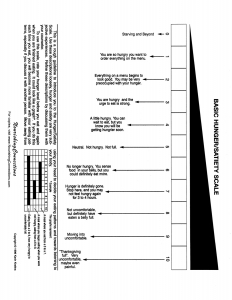
If you feel like you are able to tune in and know when you are comfortably full and yet something is missing, it could be the satisfaction factor. This is an important piece of Intuitive Eating. Stay tuned for the next blog where we will talk all about that!
Also, there is a time and place to work on Intuitive Eating. For all my eating disorder folks, make sure you speak with your dietitian or treatment team before working towards this!
If you feel you need some assistance working through this you can contact me here as always! Drop me a line if you have questions!
Happy eating!
